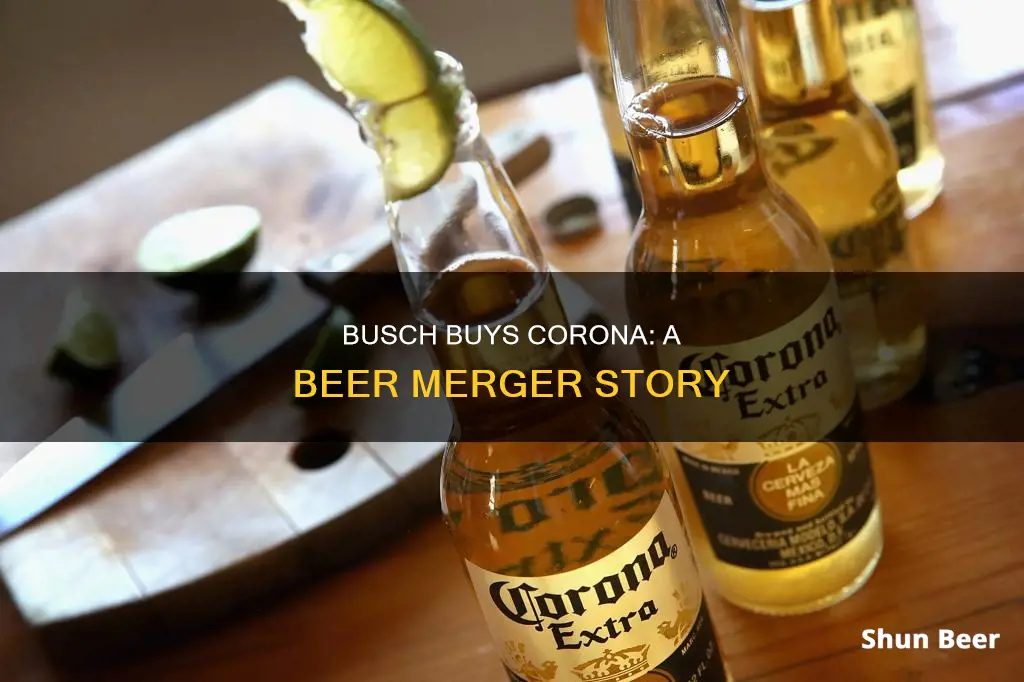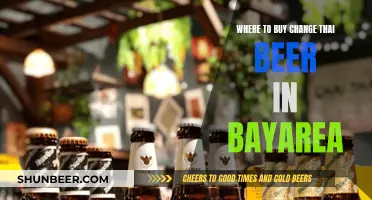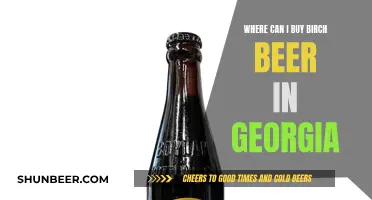
In 2012, Anheuser-Busch InBev (AB InBev) acquired Grupo Modelo, the producer of Corona, in a deal worth \$20.1 billion. AB InBev, a multinational conglomerate, is now the sole owner of Corona, which it brews under the management of Grupo Modelo. The acquisition of Grupo Modelo by AB InBev marked the end of the Mexican company's independence, as it became part of the world's largest brewing company.
| Characteristics | Values |
|---|---|
| Year Busch Bought Corona Beer | 2012 |
| Corona's Owner | AB InBev |
| Year Corona Was Introduced | 1925 |
| Year Corona Was Introduced to the United States | 1976 |
| Year Constellation Brands Acquired Full Ownership of Crown Imports LLC | 2013 |
What You'll Learn

Anheuser-Busch InBev (AB InBev) acquired Grupo Modelo in 2012
The combination of AB InBev and Grupo Modelo created a significant growth opportunity, bringing together five of the top six most valuable beer brands in the world, including Corona, Budweiser, and Stella Artois. The deal was expected to generate approximately USD 1 billion in cost synergies, with the combined company leading the global beer industry with roughly 400 million hectoliters of beer volume annually.
Following the acquisition, AB InBev announced that it would divest Modelo's entire U.S. business, including its beer licenses, a brewery in Piedras Negras, and its interest in Crown Imports, which distributed its beverages in the United States. The Modelo business was acquired by Constellation Brands in 2013 for about USD 4.75 billion. This meant that Corona would be distributed by different corporations, with Constellation Brands distributing the beverage in the United States, and AB InBev licensed to sell Corona in the rest of the world.
Miami Weiss Beer: Where to Buy and Enjoy
You may want to see also

AB InBev owns Corona globally, but not in the US
AB InBev, the world's largest brewer, owns Corona globally, but not in the US. Corona is a Mexican beer produced by Grupo Modelo, which was taken over by AB InBev in 2013. However, due to an antitrust lawsuit, AB InBev had to sell Grupo Modelo's entire US business to Constellation Brands, including the Corona brand.
Constellation Brands is now the exclusive licensee and sole importer of Corona in the US, while AB InBev retained the rights to Corona and other Modelo brands in Mexico and the rest of the world. This means that Corona is distributed by different corporations, with Constellation distributing it in the US, and AB InBev licensed to sell it in other markets.
The deal between AB InBev and Constellation Brands included a call option allowing AB InBev to buy all of Crown every 10 years at a fixed multiple. AB InBev also inherited a 50.4% stake in Modelo when it bought Anheuser-Busch in 2008.
Pennsylvania Grocery Store Beer Buying Limits Explained
You may want to see also

Constellation Brands distributes Corona in the US
Constellation Brands, Inc. is an American producer and marketer of beer, wine, and spirits. It is the largest beer import company in the US, measured by sales, and has the third-largest market share (7.4%) of all major beer suppliers. The company has more than 100 brands in its portfolio, including Corona, Modelo Especial, Negra Modelo, and Pacífico. Constellation Brands has two breweries in Mexico that produce Corona and Modelo beer for the US market.
Constellation Brands was established in 1945 by Marvin Sands in the Finger Lakes region of New York as Canandaigua Industries, selling bulk wine to bottlers in the eastern United States. In 1972, the company was incorporated as Canandaigua Wine Company, Inc. and went public in 1973. In 1999, Marvin Sands passed away, and his son Richard Sands became president in 1993 and CEO in 1996.
In 2000, the company changed its name to Constellation Brands, Inc. to reflect the scope of the company and its range of brands. The company continued to grow through multiple acquisitions in the 2000s, including Vincor International, Canada's largest wine company, for $1.44 billion in 2006, and Beam Wine Estates for $885 million in 2008.
In 2013, Constellation Brands made a significant move by acquiring Grupo Modelo's US beer business from Anheuser-Busch InBev for about $4.75 billion. This transaction included full ownership of Crown Imports LLC, giving Constellation complete control of all aspects of the US commercial business for Corona and the Modelo brands. This deal also provided Constellation with an exclusive perpetual brand license in the US to import, market, and sell Corona and Modelo beers.
As a result of this deal, Constellation Brands became the exclusive licensee and sole importer of Corona in the fifty states of the United States, Washington, D.C., and Guam. This means that Constellation Brands is responsible for distributing Corona in the US, while AB InBev owns the brand globally and brews the beer for all markets, including the US.
Constellation Brands has continued to invest in its beer business, including Corona, and has seen strong performance and double-digit operating income growth. The company has also expanded its portfolio beyond beer, with significant investments in medical and recreational cannabis through its association with Canopy Growth.
Buying Freedom: The 35 Beer Conundrum
You may want to see also

Corona is the top-selling imported beer in the US
Corona is a Mexican beer brand produced by Grupo Modelo and exported to over 150 countries worldwide. It is the top-selling imported beer in the US, a position it has held since 1988 or 1998, depending on the source. In 2024, Modelo Especial was the leading imported beer brand in the US by sales value, with Corona also featuring in the top imported brands.
Corona's popularity in the US can be traced back to the 1920s and 30s, when prohibition in the US aided the opening of new breweries on the Mexico-US border. In 1976, Grupo Modelo began exporting Corona to the US, and black markets in New York, Colorado, and Denver emerged. In 1989, Corona Light was launched, and by the mid-1990s, Corona had become the US's top-selling imported brew.
In 1993, Anheuser-Busch bought a 17.7% stake in Modelo, increasing its stake to 50% by 2008. In 2012, Anheuser Busch InBev (AB InBev) took full control of the brand, becoming the world's largest brewer. AB InBev owns Corona globally, although Constellation Brands is the exclusive licensee and sole distributor of Corona in the US.
Minhas Beer: Where to Buy and What to Know
You may want to see also

Corona is a Mexican lager
Corona is produced by the largest brewer in Mexico, Grupo Modelo, which is owned by the Belgian-Brazilian company Anheuser-Busch InBev (AB InBev). Constellation Brands is the exclusive licensee and sole importer of Corona in the United States, Washington, D.C., and Guam. AB InBev owns the rights to Corona in all other markets and is responsible for brewing the beer for all markets, including the US. Corona is now also brewed in China for the Australasia market.
Corona's most popular variation is Corona Extra, a pilsner-style pale lager that weighs in at 4.5% alcohol. It is one of the top-selling beers worldwide and has been the top-selling imported drink in the US since 1998. Other variants include Corona Light, Corona Premier, and Corona Familiar. In March 2020, a range of flavoured hard seltzers was launched under the Corona brand name.
Corona's distinctive crowned logo was inspired by the crown adorning the Cathedral of Our Lady of Guadalupe in Puerto Vallarta. The label and logo were designed by Eduardo Cataño, who worked for the advertising company Galas de México. The brand is famous for its association with a calm, tropical beach, an image that has been reinforced through its advertising campaigns.
Buying Beer at Virginia Gas Stations: What's the Deal?
You may want to see also
Frequently asked questions
Anheuser-Busch InBev bought Grupo Modelo, the producer of Corona, in 2012 for $20.1 billion.
Corona is owned by Anheuser-Busch InBev, a multinational conglomerate.
Constellation Brands distributes Corona in the US.
Corona is a Mexican lager brewed by Grupo Modelo. It is the top-selling imported beer in the US.
Corona is often served with a wedge of lime or lemon in the neck of the bottle to add tartness and flavor.







